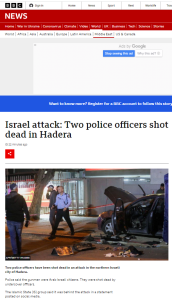
Late on March 27th the BBC News website’s ‘Middle East’ page published a report about a terror attack that had taken place several hours earlier under the headline “Israel attack: Two shot dead in Hadera”.
Some eight hours later the report was amended to include additional information and its headline was changed to “Israel attack: Two police officers shot dead in Hadera”.
Around three hours later – i.e some fourteen and a half hours after the attack had taken place – it was amended for a second time and the headline was changed to read “Israel: Two police killed by Israeli Arab gunmen in Hadera”.
Although the information was available by the time the second version of the report was published, the names of the two people killed in the attack – Corporal Yazan Falah from Kisra-Sumei and Corporal Shirel Abukarat from Netanya, both aged 19 – only appeared in its third version.
As was the case in a report on another terror attack several days earlier, neither in the headline nor in any versions of the report itself did the BBC clarify in its own words that what took place was a terror attack. In line with the selectively applied BBC editorial guidelines – “We should not use the term ‘terrorist’ without attribution” – the sole mention of the word terrorist in the report’s second version came in a quote from an Israeli official:
“”Our officers managed to neutralise the assailants and prevent a bigger terrorist attack,” national police spokesman Eli Levy told Israeli TV.”
In the third version the only mention of the word terrorist appeared in an embedded tweet from the US Secretary of State.
By the time the second version of the BBC’s report was published a court order preventing publication of the names of the terrorists had been issued even though that information was already in the public domain. In that version BBC audiences were told that:
“Police said the gunmen were Israeli Arab citizens. They were shot dead by undercover officers. […]
One of the assailants in the latest incident tried to join IS and officials are looking for connections between the attacks, Haaretz reports.”
The BBC did not clarify that the attempt “to join IS” in Syria via Turkey took place in 2016. The fact that the two terrorists were from Umm al Fahm in northern Israel only appeared in the third version of the report.
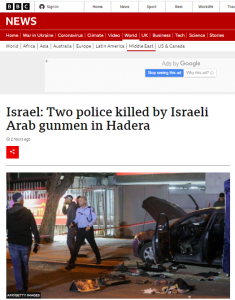
In relation to the as yet unverified claim of responsibility for the attack, the second version of the report stated:
“The Islamic State (IS) group said it was behind the attack in a statement posted on social media. […]
The Islamic State group’s claim of responsibility is unusual – the intelligence group SITE said it was the first time it had taken credit for an attack in Israel since 2017.”
In the third version readers were told that:
“Attacks in Israel linked to IS are rare, the last being in June 2017 when IS said it was behind a gun and knife attack in Jerusalem that killed a policewoman.”
Readers may recall that the BBC’s original report on the 2017 attack in which Border Police officer Hadas Malka was murdered was titled “Three Palestinians killed after deadly stabbing in Jerusalem” and that was also how the BBC portrayed the incident on social media until amendments were made following public objection.
Readers of the second version of the BBC’s report on the Hadera attack were told that:
“Sunday’s incident occurred as Israel hosts an historic summit with three Arab League states with which it has normalised ties, as well as Egypt and the US.
Israel’s Foreign Minister Yair Lapid said that all his counterparts at the meeting had condemned the attack. However, it was praised by the Hamas militant group which governs Gaza as a “heroic operation”.”
The third version of the BBC’s report did not include that information about Hamas’ praise for the attack and at no point were readers told that additional terrorist groups praised the attack, including Hizballah, which sought to link it to the Negev summit.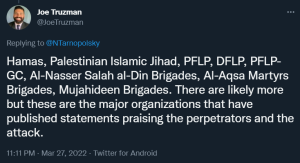
The second version of the report closed with a euphemistic reference to “religious holidays”:
“There have been several recent attacks amid concerns that tensions are rising ahead of religious holidays.”
The third version closed as follows:
“There are fears of further incidents in the month ahead, when the Muslim festival of Ramadan, the Jewish festival of Passover and the Christian festival of Easter coincide in a rare convergence.”
The BBC however elected not to inform its audiences of calls from Palestinian terrorist organisations to “step up the “resistance” against Israel in the coming days and weeks”.
Related Articles:
REVIEWING BBC COVERAGE OF THE BE’ER SHEVA TERROR ATTACK
BBC NEWS CHANGES HEADLINE, DELETES TWEET AFTER ANGER AT PORTRAYAL OF TERROR ATTACK IN JERUSALEM
NO BBC NEWS FOLLOW-UP ON GOLAN PARAGLIDER STORY
WHERE DO ISIS RELATED INDICTMENTS MAKE BBC NEWS – AND WHERE NOT?

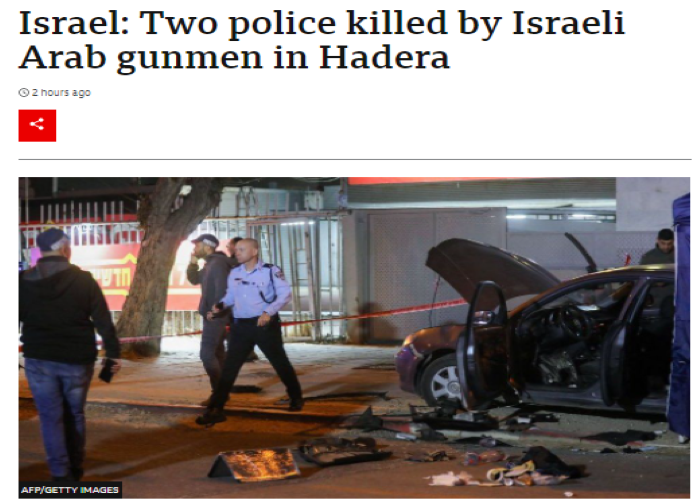
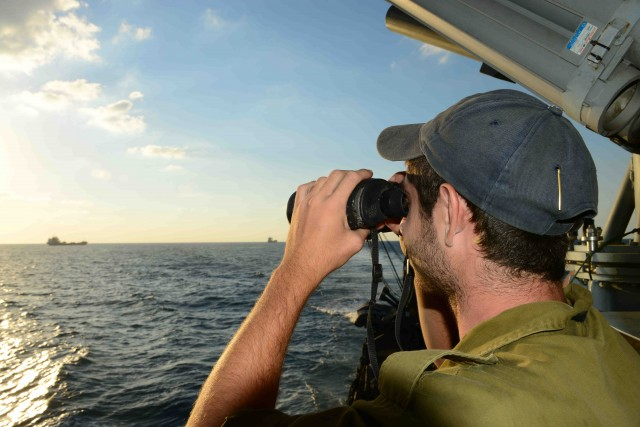

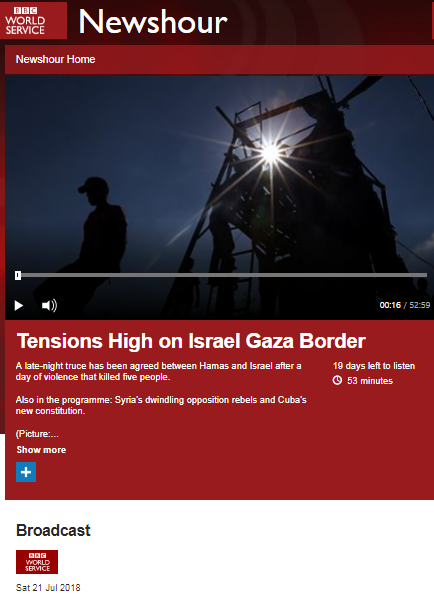

The word “terrorist” will never be used by the BBC Middle East office and every incident will be reported in conformation with precise instructions issued by the Iran propaganda machine.